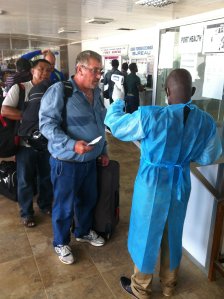
ATLANTA, Georgia (CNN)-
All travelers coming from Ebola-stricken Guinea, Liberia or Sierra Leone into the United States will be required to monitor their temperatures for 21 days and keep an eye on possible Ebola symptoms, starting on Monday, the Centers for Disease Control and Prevention announced Wednesday.
After being screened in the country they are departing and being screened when they arrive in the United States, those travelers also will be required to report daily health information to state and local health department for 21 days, which is the maximum time for someone infected with Ebola to start getting sick.
Health officials will also be collecting detailed contact information, including two email addresses, two phone numbers and contact information for a relative or a friend, all in an effort to track anybody who has returned from a country with Ebola. If someone travels within a state or to another state, they have to inform health officials as well.
During the monitoring period, travelers from those West Africa nations have to report their temperature twice daily, as well any symptoms they may have developed such as headache, joint pain, muscle weakness, diarrhea and vomiting. In the event that a traveler does not report in, “state or local public health officials will take immediate steps to locate the individual to ensure that active monitoring continues on a daily basis,” according to CDC director Dr. Thomas Frieden.
Each passenger arriving from the Ebola-stricken countries will receive a “Check and Report Ebola,” or CARE, kit. It contains detailed information on who to call, a picture diagram of symptoms associated with Ebola, a 21-day diary for passengers to record their morning and evening temperatures, and a digital thermometer with detailed instructions on how and when to take their temperatures (for example, don’t share it, don’t take your temperatures right after eating or drinking). The thermometers do not have to be returned.
Frieden said his agency is discussing with states how they may most effectively monitor these travelers and suggested this could include communicating with health officials via Skype or Facetime.
Seventy percent of travelers from these West African countries are headed to six states, according Frieden. He said New York, Pennsylvania, Maryland, Virginia, New Jersey, and Georgia have already taken steps to hand out these CARE kits.
Nobody will be excluded from these new regulations, according to Frieden. He said the new regulations will apply to everyone including CDC staffers returning from deployment in one of these three countries and journalists.
“In the event a traveler begins to show symptoms, public health officials will implement an isolation and evaluation plan following appropriate protocols to limit exposure, and direct the individual to a local hospital that has been trained to receive potential Ebola patients,” the CDC posted on its website.
“This is another step to protect families, communities and health care workers from Ebola, said Frieden. He added that these measures will continue for the foreseeable future until Ebola is stopped at the source.
